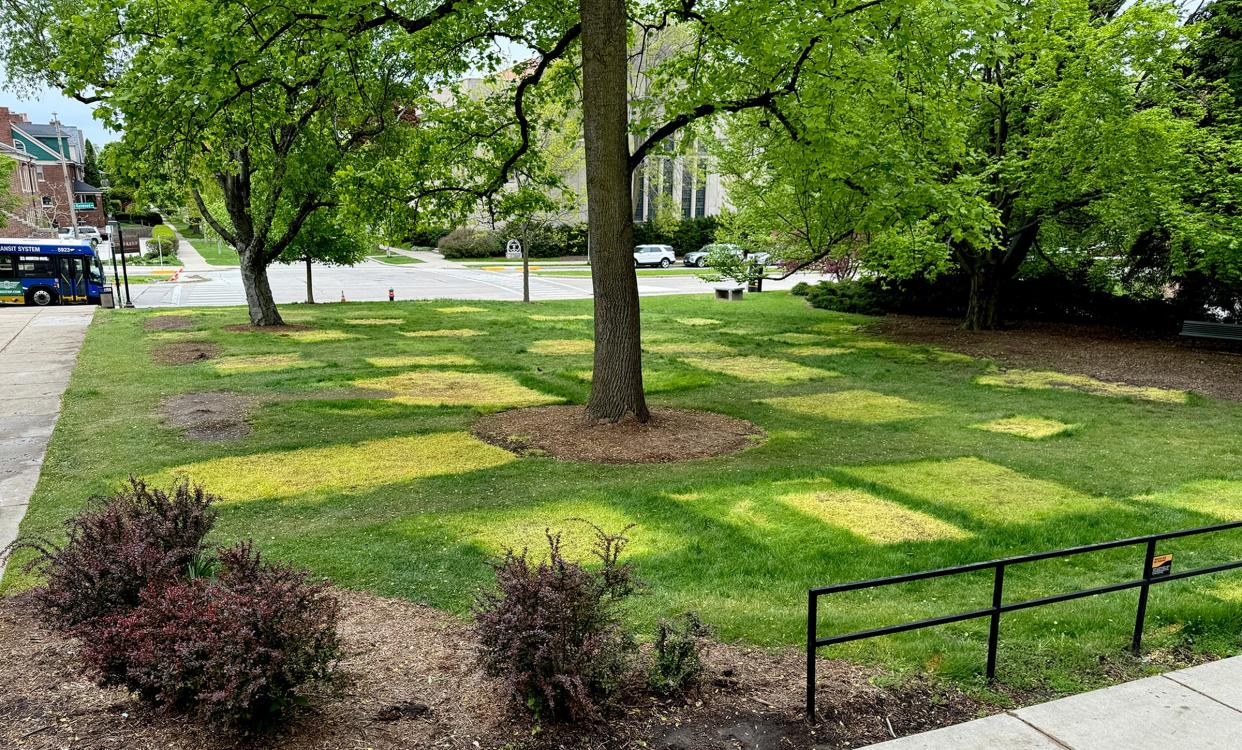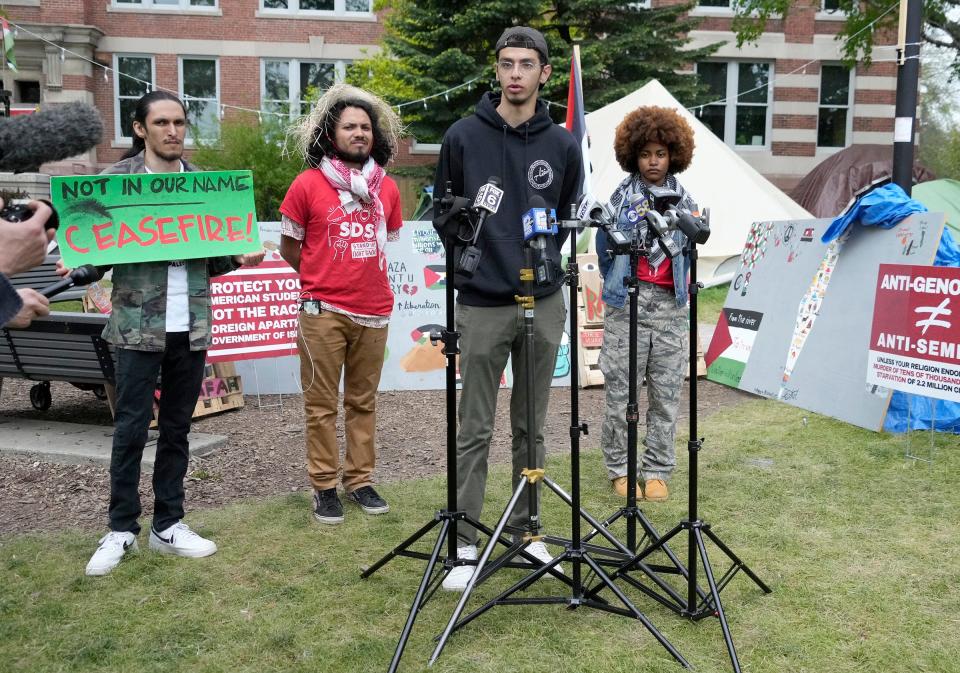Student protesters declare victory in deal with UW-Milwaukee, keep door open for more protests

Local Jewish organizations are slamming the deal University of Wisconsin-Milwaukee administrators struck to end the pro-Palestinian encampment, arguing the school caved to student protesters' demands and failed to support Jewish students.
The criticism comes as protesters took down some 40 tents outside Mitchell Hall and met Tuesday with a UWM Foundation leader, urging him to disclose any investments tied to Israel.
The students, who are taking final exams this week, said they plan to continue activism into the summer, including protesting at the Republican National Convention.
There is a chance protests could extend into the fall. At a news conference Monday, protest leaders kept the door open to set up tents again if they are unsatisfied with university administrators and the foundation.
"The struggle is not over. The fight is not over. The fight is to disclose. We're going into this (Tuesday) meeting with the intentions (of) full disclosure, and if we don't get that, we're going to keep going," said Audari Tamayo, co-chair of the Students for a Democratic Society.
UWM students' agreement followed a deal protesters struck with UW-Madison administrators to take down the encampment there. Part of the deal with the campus's Students for Justice in Palestine chapter required the group to respect the state rule banning tents on university property. When asked about the possibility of pitching tents in the fall, UW-Madison protest spokesperson Dahlia Saba said she couldn't "speak to that," and pointed out the agreement was only with the Students for Justice in Palestine chapter.
Protesters urge UWM Foundation to disclose investments
The UWM students met Tuesday with the president of the UWM Foundation, David Gilbert. The "bare minimum," Tamayo said, was to transparently disclose the foundation's investments.
"If they're not guilty, then they need to prove it," he said.
Over the last two weeks, student organizers calling for an end to the Israel-Hamas war held a series of events on the lawn, such as rallies, teach-ins, religious services and workshops on poetry, painting and music. Organizers said over 100 people were regularly camping overnight.
School administrators took a hands-off approach and declined to send in police. They met with protest leaders at least three times.
In Tuesday's meeting, protest leaders asked for a timeline for actions to be taken. Gilbert did not agree to that but said he would share the students' concern with the full foundation board. Gilbert also asked the students to put their specific requests in writing, UWM spokeswoman Angelica Duria said in a statement.
"Future encampments will not be tolerated and, should they be erected, UWM will exercise citations and the student conduct process immediately. Protests need to abide by state law and university policy," Duria said.
More: After 12 day-encampment, UW-Madison protesters reached deal. Why? And what's next?

More: After 12 day-encampment, UW-Madison protesters reached deal. Why? And what's next?
Protesters see deal as a victory as graduation nears
In response to protesters' demands, the university agreed to review study abroad programming to ensure it aligns with the university's discriminatory conduct policy. It also agreed to forgo citations or conduct violations related to the camping ban. The university called for a ceasefire in Gaza and condemned the destruction of universities.
In one of the more notable concessions, UWM said it had successfully urged the Water Council, a Milwaukee-based nonprofit focused on water issues, to end its relationships with two Israeli government-owned water companies.
UWM's deal was reached days before commencement, which will be held May 19 at the UWM Panther Arena. Protesters agreed not to disrupt the ceremony.
Ameen Atta, a Palestinian-American student leader, said the swell in community support for the encampment over the last two weeks was "absolutely overwhelming." UWM has a sizeable Palestinian-American population, and many in Milwaukee's broader Muslim community donated meals and supplies to the students. Evening gatherings at the encampment often included children, families and older adults.
"My only focus is putting eyes on Gaza, putting eyes on those who are suffering, and I think we absolutely did that," Atta said. "I think we started an immense change here. We continued an immense movement that was already happening on a national scale, and we did our part here."
More: Why UW campus protesters’ rallying cry to divest from Israel faces resistance
Jewish groups slam chancellor, deal
Some Jewish students on campus have regarded the encampment warily and have tried to avoid it, frustrated with the protesters' rhetoric. Others said they were grateful the campers were peaceful. Still others participated in rallies at the encampment, advocating from an anti-Zionist perspective.
Meanwhile, Jewish organizations criticized the agreement. The Milwaukee Jewish Federation and Hillel Milwaukee, a Jewish student group, called Chancellor Mark Mone's decision to strike a deal "reprehensible" and "shocking."
"This negotiated settlement is exclusionary, inflammatory, and materially harmful to students," the two groups said in a joint statement.
In an extended statement that also included the Anti-Defamation League Midwest, the groups said Mone "capitulated to protesters" who violated state rules and fueled antisemitism. They argued not charging protesters "sets a dangerous precedent."
They also criticized what they saw as administrators' lack of support for Jewish students' safety after antisemitic incidents on campus. During an Israeli cultural celebration held by Hillel Milwaukee's UWM club last month, pro-Palestinian protesters encircled the Jewish students who gathered. Students said it left them shaken.
The groups said Mone was "negligent" in his duty to keep students safe, and that many in the Milwaukee Jewish community were angry "this process was handled so badly."
The university responded to the Jewish groups in a statement: “UWM is deeply concerned by the statement made by Hillel Milwaukee and the Milwaukee Jewish Federation, and UWM leaders are taking time to understand the concerns before responding comprehensively, which we plan to do soon.”
Protesters balanced classes, activism
Student organizers like Atta have dedicated hours upon hours of their time in the last two weeks of the semester to lead programming. Atta, an information technology management major, said juggling classwork with protest organizing has meant sacrificing sleep.
"It's taken over our lives, and we're proud of that," he said.
Atta had a final exam Monday for a coding class. Later that day, a cleanup crew worked to take down the tents and the surrounding barricade of scrap wood and overturned folding tables.
"We're happy to do it again, and we're happy with the outcome," he said.
Kelly Meyerhofer of the Journal Sentinel contributed to this report.
Contact Sophie Carson at scarson@gannett.com or 920-323-5758.
This article originally appeared on Milwaukee Journal Sentinel: Pro-Palestinian protesters cheer encampment deal with UW-Milwaukee

